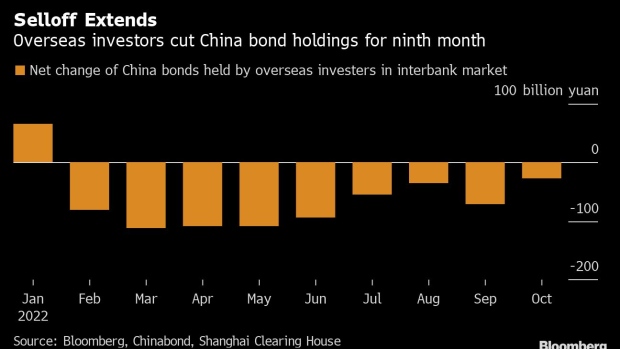Nov 15, 2022
Global Exodus From China Bonds Extends Amid Post-Congress Rout
, Bloomberg News

(Bloomberg) -- Global investors reduced their holdings of China bonds in the onshore market for a ninth-month running in October amid concerns over policy uncertainty spurred by President Xi Jinping’s consolidation of power.
The amount of Chinese bonds held by foreign investors in the interbank market declined by 26.5 billion yuan ($3.8 billion) in October, after a drop of 70.7 billion yuan in the previous month, according to data from China Central & Depository Clearing Co. and Shanghai Clearing House. That brings bond outflows in the first 10 months of the year to 625 billion yuan.
The bond outflows are consistent with losses in other Chinese assets last month following the conclusion of the party congress. Stocks saw a record withdrawal of foreign funds in late October while the yuan depreciated to a 15-year low.
Sentiment has improved this month as China tweaked its Covid policy and announced steps to support the housing market.
Morgan Stanley last week cut its annual inflow estimate for China. While it expects equities to lead a rebound in flows as a growth recovery firms up in the second-half of next year, it forecasts bond buying to resume at a slower pace partly due to the policy cycle divergence. China government bonds may see an outflow of $24 billion in 2023, versus around $90 billion in 2022 and inflows may not resume till in 2025, according to Morgan Stanley estimates.
Foreign investors sold a net 5.7 billion yuan of Chinese government bonds and 19.5 billion yuan of the quasi-sovereign policy bank notes, the Chinabond data show. They also cut 250 million yuan of local government bonds and bought a net of 9.5 billion yuan of negotiable certificate of deposits, a popular short-term debt issued by banks.
Global investor holdings of Chinese bonds in the interbank market stood at 3.38 trillion yuan as of last month. Foreign ownership of government notes stood at 9.4% of the total outstanding volume at the end of October, broadly steady at the previous month’s levels.
(Corrects story published on Nov. 15 to refer to “China bonds” rather than “China government bonds” in lead.)
©2022 Bloomberg L.P.






